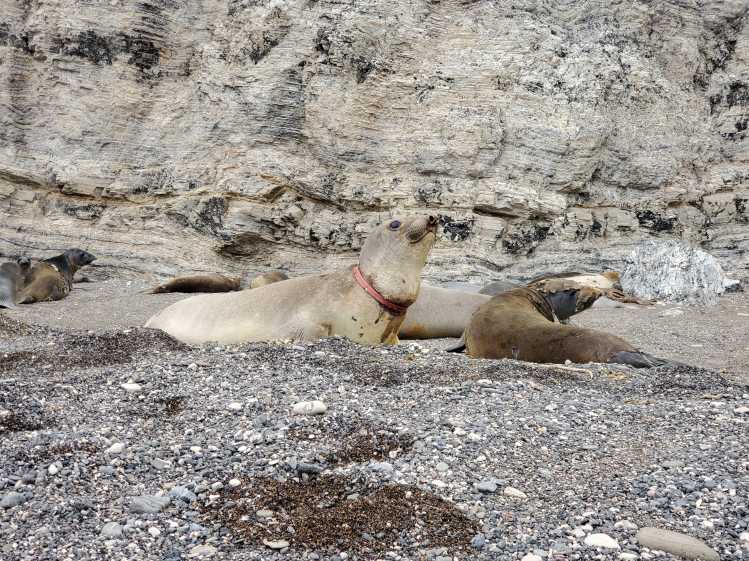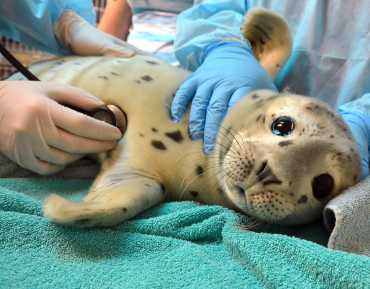
Life-Saving Disentanglement Frees Northern Elephant Seal Liddie from Ocean Trash
- Entanglement
- Ocean trash
Nestled by the seaside cliffs at Vandenberg Space Force Base in Central California, a major spacecraft-launching hub that also happens to be homebase to a colony of northern elephant seals, marine mammal researchers spotted a skinny animal in a life-threatening situation. Named Liddie, this seal had a plastic bucket lid’s rim secured tightly around her neck.

Among the scientists who were on the beach that day studying weaned elephant seal pups were The Marine Mammal Center’s veterinary experts and our partners at California Polytechnic State University, San Luis Obispo (Cal Poly) and Vandenberg Space Force Base. Fortunately for elephant seal Liddie, these experts were already stocked with the medical supplies and equipment necessary to disentangle her.
Beginning this rescue mission was not a simple task, however, as it required authorization from the National Oceanic and Atmospheric Administration (NOAA), but the remote beach on Vandenberg Space Force Base has no cell phone service. On top of this challenge, the beach is only accessible to researchers by rope rappelling with the help of experienced climbers.
And so, the rescue request was relayed: 1) A hand-written note from the Center’s veterinarian Dr. Heather Harris was carried to other team members at the top of the rocky cliffs. 2) The team transmitted the message by radio to scientists at the base. 3) A phone call was made to NOAA’s stranding coordinator, who ultimately authorized the rescue.


Without medical intervention, this entangled elephant seal likely would have died. Thanks to this monumental team effort and support from people like you, the plan was put in motion to save Liddie’s life.
Based on Dr. Harris’s knowledge of patients at the Center and of similar rescues in the past, she determined the correct amount of sedative to safely calm the animal. Informed estimates of Liddie’s weight, age and body condition were all considered to measure out the right dosage.

On the beach, our experts slowly approached the elephant seal and administered the sedative using a syringe on an extended pole. Once it was safe to do so, Dr. Harris cut through the thick plastic ring that was embedding deeply into Liddie’s skin and blubber. She then cleaned the entanglement wounds on the neck and provided antibiotics to help heal the infection.


Increased amounts of trash are sadly being found in our ocean, creating the very serious threat of entanglement for countless marine mammals like Liddie. Our experts are highly trained to rescue animals caught in entanglements, such as lost or discarded fishing gear, plastic packing straps and other pieces of trash like the bucket lid that Liddie had encountered. Thankfully, caring people like you make life-saving rescues like this possible.
Because of support from caring people like you, Liddie made her way down the beach and dove into the ocean waves—finally free.

You can tackle ocean trash and continue making a life-saving difference for marine mammals like Liddie, regardless of where you live in the world. Find ways to take action in your daily life and community to reduce your plastic footprint here.
Studying Elephant Seals of the Central California Coast

What were marine mammal researchers doing on the beach the day they spotted Liddie? The Center’s experts are partnering with Cal Poly to study the migration patterns and clinical health of weaned elephant seal pups in the wild.
Learn more about our collaborative elephant seal research.
Yes, I want to save a life!

Yes, I want to save a life!
You’ll be giving sick and injured animals the best possible care at the Center’s state-of-the-art hospital. With your gift today, you are giving a patient a second chance at life in the wild.
See Our Latest News
{"image":"\/Animals\/Wild\/Gray whale\/cropped-images\/two-gray-whales-golden-gate-bridge-shutterstock-0-0-1270-992-1770234810.jpg","alt":"two gray whales under the Golden Gate Bridge","title":"The Marine Mammal Center and San Francisco Harbor Safety Committee Pilot New Vessel Operator Training Program","link_url":"https:\/\/www.marinemammalcenter.org\/news\/the-marine-mammal-center-and-san-francisco-harbor-safety-committee-pilot-new-vessel-operator-training-program","label":"Press Release","date":"2026-02-06 01:00:00"}

The Marine Mammal Center and San Francisco Harbor Safety Committee Pilot New Vessel Operator Training Program
February 6, 2026
Read More{"image":"\/Animals\/Wild\/Bottlenose dolphin\/cropped-images\/dolphinphoto-by-adam-li-c-noaa-0-0-1270-992-1769539954.jpg","alt":"A bottlenose dolphin jumps out of the water.","title":"What\u2019s the Difference Between Dolphins and Porpoises? And Other Animal Trivia","link_url":"https:\/\/www.marinemammalcenter.org\/news\/whats-the-difference-between-dolphins-and-porpoises-and-other-animal-trivia","label":"News Update","date":"2026-01-26 23:00:00"}

What’s the Difference Between Dolphins and Porpoises? And Other Animal Trivia
January 26, 2026
Read More{"image":"\/Animals\/Patients\/Sea otters\/2025\/cropped-images\/so-mooring-release-2-laurie-miller-c-the-marine-mammal-center-USFWS-permit-MA101713-1-147-8-1270-992-1770307740.jpg","alt":"Sea otter - Mooring","title":"Rescue Stories: Southern Sea Otter Mooring Named the 2025 Patient of the Year","link_url":"https:\/\/www.marinemammalcenter.org\/news\/rescue-stories-vote-for-your-favorite-marine-mammal-patient-of-2025","label":"News Update","date":"2026-01-16 10:05:08"}

Rescue Stories: Southern Sea Otter Mooring Named the 2025 Patient of the Year
January 16, 2026
Read More{"image":"\/People\/Action\/Veterinary care\/cropped-images\/Harris_Green turtle_TMMC-0-0-1270-992-1767649941.jpg","alt":"Heather Harris","title":"Seattle Aquarium Awards Dr. Heather Harris With Prestigious Conservation Research Award","link_url":"https:\/\/www.marinemammalcenter.org\/news\/seattle-aquarium-awards-dr-heather-harris-with-prestigious-conservation-research-award","label":"In the News","date":"2026-01-05 04:48:00"}

Seattle Aquarium Awards Dr. Heather Harris With Prestigious Conservation Research Award
January 5, 2026
Read More